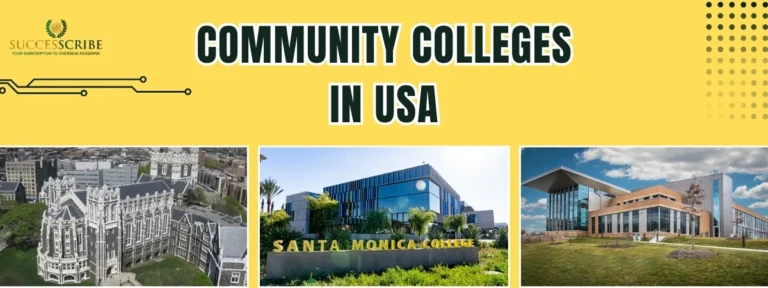Supply Chain Management (SCM) has emerged as one of the most critical business disciplines globally, ensuring the smooth flow of goods, information, and services from origin to consumption. As global commerce evolves rapidly with digitalization and real-time logistics, the need for skilled supply chain professionals has risen significantly.
A Masters in Supply Chain Management in USA provides students with a strong foundation in logistics, operations, procurement, data analytics, and sustainable practices, all taught by world-renowned faculty using cutting-edge technologies.
Key Highlights
A Master’s in SCM is a graduate-level program that typically lasts 12 to 24 months. It prepares students for roles such as supply chain analysts, logistics managers, procurement officers, operations consultants, and inventory strategists.
| Feature | Description |
| Duration | 12–24 months |
| Eligibility | Bachelor’s degree in related field |
| GRE/GMAT | Often required (some waive with work experience) |
| STEM Certified | Yes (in many universities) |
| Cost | $25,000 to $70,000 per year |
| Starting Salary | $70,000–$120,000 per year |
Why Study Supply Chain Management in USA?
Pursuing a Masters in Supply Chain Management in USA continues to be a smart and strategic choice for international students in 2025. Here’s why:
- Industry Connections: Home to Amazon, Walmart, Apple, and FedEx, the U.S. offers unmatched industry exposure and job opportunities.
- Top-Ranked STEM Programs: Universities like MIT and Michigan State offer STEM-certified SCM degrees, allowing up to 3 years of post-study work (OPT).
- Hands-on Learning: U.S. programs emphasize practical experience through internships, capstone projects, and real-time supply chain simulations.
- High ROI: Graduates earn $75,000–$120,000+ annually, with strong growth in roles like logistics, procurement, and analytics.
- Diverse, Global Environment: Study alongside peers from around the world and build a global professional network.
Program Formats & Duration
The MS route focuses on technical depth, while MBA formats build managerial and leadership skills.
| Program Type | Duration |
| MS in Supply Chain Management or Logistics | 9–24 months |
| MBA with SCM Concentration | 2 years |
| MEng in Logistics / Operations | 12–18 months |
Top Universities for Masters in Supply Chain Management in USA

When you pursue a Masters in Supply Chain Management in USA, you’re not just joining a classroom, you’re entering the innovation hubs of MIT, Georgia Tech, and Michigan State, where the future of logistics is being written.
| University & School | Program Name | Duration |
| MIT – Massachusetts Institute of Technology (SCALE) | MEng/MAS in Supply Chain Management (Residential) | 10 months |
| Michigan State University (Broad College) | MS in Supply Chain Management | 21 months |
| Georgia Institute of Technology (ISyE/Scheller) | MS in Supply Chain Engineering | 12 months (or 16 with internship) |
| Boston University (Questrom) | MS in Supply Chain Management | 12–20 months |
| University of Michigan (Ross) | MSCM | 10 months |
| Penn State (Smeal) | MS in Supply Chain Management | 12 months |
| Purdue University (Krannert) | MS in Global Supply Chain Mgmt | 11–18 months |
| University of Washington (Foster) | MS in Supply Chain Management | 12 months |
Suggested Post: Top Medical colleges in USA
Admission Requirements for Master’s in Supply Chain Management in the USA
Admission criteria may vary slightly across universities, but most follow a common structure. Here’s a breakdown of everything you need to apply for an MSCM program in the U.S.:
1. Academic Qualifications
| Requirement | Details |
| Bachelor’s Degree | Must have a 4-year undergraduate degree (or equivalent 3-year degree in some cases*) in fields such as Business, Engineering, Economics, Management, Logistics, or related disciplines. |
| Minimum GPA | Most universities expect a GPA of 3.0 on a 4.0 scale or equivalent. Some top schools like MIT may prefer 3.5+. |
Some universities accept 3-year degrees from India if evaluated by WES or equivalent.
2. English Language Proficiency (For International Students)
| Test | Minimum Score |
| IELTS | 6.5–7.5 overall band |
| TOEFL iBT | 90–100 (Some universities accept 80+) |
Even if you’re from an English-speaking country, some universities may still require proof of proficiency unless your previous education was in English.
3. Standardized Test Scores (GRE/GMAT)
| Test | Requirement |
| GRE | Many universities require 300+ (Verbal + Quant combined). Some waive it for strong academics or work experience. |
| GMAT | Not always required unless you’re applying for an MBA with a Supply Chain focus. Average score range: 600–680. |
| Test Waiver | Several universities like Rutgers, Purdue, ASU, and Michigan State may offer GRE/GMAT waivers for applicants with relevant work experience or strong undergraduate performance. |
Check the specific school’s website for test waiver policies.
4. Work Experience (Optional but Preferred)
| Parameter | Details |
| Experience Requirement | Not mandatory for most programs, but 1–2 years of relevant work/internship in logistics, supply chain, or operations is preferred. |
| Executive Programs | Require 3–5+ years of managerial or industry experience. |
Even if it’s not required, having real-world experience boosts your chances significantly, especially for practical, project-based programs.
5. Application Materials
You’ll be required to submit the following documents with your application:
| Document | Description |
| Statement of Purpose (SOP) | A well-written essay (500–1000 words) explaining your interest in supply chain, career goals, and why you’re applying to the specific university. |
| Resume or CV | Updated resume with education, work experience, internships, certifications, and projects. |
| Letters of Recommendation | Typically 2 or 3 from academic professors or professional supervisors. Should comment on your analytical, teamwork, and leadership abilities. |
| Transcripts | Official academic records from all previous institutions attended. |
| Proof of Financial Support | Bank statements or sponsor letters (required for I-20 issuance and F-1 visa application). |
| Passport Copy | A scanned copy of your passport bio page (for identity verification and visa documents). |
6. Application Fee
| University Type | Fee Range |
| Public Universities | $50–$75 |
| Private Universities | $75–$150 |
Some schools offer application fee waivers during early application periods or for students from developing countries.
7. Application Deadlines
| Term | Typical Deadline |
| Fall Intake (August/Sept) | Dec – March (Earlier is better) |
| Spring Intake (Jan/Feb) | Aug – Oct (Limited programs available) |
Apply early (especially for Fall intake) to qualify for scholarships and assistantships.
Suggested Post: Masters in cloud computing in USA
Curriculum Overview – Master’s in Supply Chain Management

The curriculum for a Master’s in Supply Chain Management is designed to provide students with a blend of theoretical knowledge, analytical tools, and hands-on experience needed to manage global supply chains efficiently. It emphasizes logistics, operations, procurement, analytics, sustainability, and technology integration. Every course in a Masters in Supply Chain Management in USA is designed not to teach you theory, but to make you the architect of real-world supply chain transformation.
Most programs span 9 to 24 months and include core courses, electives, capstone projects, and sometimes internships or industry immersion.
Core Courses (Foundation of SCM)
These mandatory courses build your fundamentals in supply chain strategy, operations, and systems thinking.
| Core Course | What You’ll Learn |
| Supply Chain Strategy | Frameworks for designing competitive global supply chains. |
| Logistics & Distribution Management | Optimizing transportation networks, warehousing, and delivery systems. |
| Operations Management | Managing manufacturing systems, lean operations, and capacity planning. |
| Procurement & Sourcing | Strategic sourcing, supplier selection, and contract negotiation. |
| Inventory & Warehouse Management | Inventory control techniques, demand forecasting, safety stock. |
| Supply Chain Analytics | Using Excel, Python, SQL, or R for data-driven decision-making. |
| Global Supply Chain Management | Cross-border logistics, trade compliance, and international supply chain risks. |
Elective Courses (Customize Your Path)
Electives allow you to specialize based on your career goals, whether in analytics, sustainability, digital transformation, or leadership.
| Elective Course | Focus Area |
| Sustainable Supply Chain Management | Circular economy, carbon footprint reduction, green logistics. |
| Blockchain & IoT in SCM | Real-time tracking, smart contracts, and transparency in the chain. |
| Supply Chain Risk Management | Managing disruptions, supplier failures, and crisis planning. |
| Demand Planning & Forecasting | Predictive analytics using historical sales and market trends. |
| AI & Machine Learning in SCM | Automated replenishment, demand sensing, and route optimization. |
| Supply Chain Finance | Financial flows, working capital, and payment terms across the chain. |
| Project Management | Agile and Six Sigma tools to lead cross-functional supply chain initiatives. |
Capstone Project / Industry Practicum
Most U.S. programs culminate in a capstone project, where students solve a real-world supply chain problem for a company or nonprofit.
Example Capstone Topics:
- Redesigning Amazon’s last-mile delivery network
- AI-powered inventory optimization for a retail chain
- Building a resilient supplier network post-COVID
- Creating a sustainable packaging model for a cosmetics brand
Some universities offer internships or industry immersion trips as part of the curriculum (e.g., MIT Global SCALE Network or MSU’s corporate practicum).
Technical Tools & Software Used
Students often gain hands-on experience with industry-standard tools:
| Tool | Usage |
| SAP | ERP systems and logistics modules |
| Tableau/Power BI | Data visualization for supply chain dashboards |
| Python & R | Analytics, modeling, and ML |
| SQL | Data queries and relational databases |
| Excel + Solver | Linear programming and decision modeling |
| AnyLogistix / Arena | Supply chain simulation |
Suggested Post: Masters in construction management in US
Career Scope & Job Opportunities

With a Masters in Supply Chain Management in USA, you’re not applying for jobs, you’re stepping into boardrooms, solving crises, and optimizing billion-dollar networks.
Graduates of SCM programs in the U.S. enjoy robust job opportunities across industries like tech, manufacturing, retail, healthcare, and e-commerce.
Top Hiring Companies
- Amazon
- Walmart
- Deloitte
- FedEx
- Apple
- Boeing
- UPS
- General Motors
Common Job Titles
| Role | Average Salary |
| Supply Chain Analyst | $70,000–$90,000 |
| Procurement Manager | $90,000–$110,000 |
| Operations Manager | $95,000–$120,000 |
| Logistics Manager | $80,000–$105,000 |
| Demand Planner | $75,000–$95,000 |
| Inventory Manager | $85,000–$110,000 |
Suggested Post: Masters in electrical engineering in USA
Salary after Master’s in Supply Chain Management in USA\
A Masters in Supply Chain Management in USA isn’t just a degree, it’s a high-yield investment that pays off in six-figure careers across industries that never sleep. Here’s a breakdown of average salaries based on job roles:
| Job Role | Entry-Level | Mid-Career | Senior Level |
| Supply Chain Manager | $75,000 | $100,000 | $130,000+ |
| Operations Analyst | $65,000 | $90,000 | $120,000 |
| Procurement Analyst | $70,000 | $95,000 | $125,000 |
| Logistics Director | $90,000 | $120,000 | $160,000+ |
According to the U.S. Bureau of Labor Statistics, the employment for logisticians is projected to grow 18% from 2022 to 2032, much faster than the average.
Cost of Studying Master’s in Supply Chain Management in the USA

Total Estimated Cost per Year: $50,000 – $115,000
Public universities like Purdue or ASU cost closer to $50k–$70k/year. Elite schools like MIT or CMU may cost up to $110k–$115k/year including living expenses.
| Expense Category | Estimated Annual Cost (USD) | Remarks |
| Tuition Fees | $30,000 – $82,000 | Public universities: $30k–$50k; Private/unranked: $50k–$82k (e.g., MIT, CMU) |
| Living Expenses | $12,000 – $20,000 | Includes housing, utilities, groceries; varies by city (NYC, LA, Boston = high; Midwest = low) |
| Food & Personal Costs | $3,000 – $5,000 | Eating out, toiletries, laundry, clothing, phone, etc. |
| Books & Supplies | $1,000 – $1,500 | Textbooks, course materials, software subscriptions |
| Transportation | $1,000 – $2,000 | Local transport or occasional domestic travel |
| Health Insurance | $1,200 – $2,500 | Mandatory for all international students |
| Flight Tickets (India–USA) | $1,000 – $1,500 | One-time or annual return flight (round trip) |
| Student Fees & Misc | $500 – $1,000 | Technology fees, student union, orientation, etc. |
Suggested Post: Masters in engineering management in USA
Scholarships for Master’s in Supply Chain Management in the USA
These scholarships may be merit-based, need-based, or tied to specific programs, nationalities, or academic achievements.
1. University-Based Scholarships
Many U.S. universities offer internal scholarships and assistantships to MSCM students based on academic excellence, leadership potential, or diversity background.
| University | Scholarship Name | Amount / Benefit | Eligibility |
| MIT SCM | SCALE Excellence Fellowship | Partial to full tuition waiver | Outstanding international applicants |
| Michigan State University | Broad Graduate Fellowships | Up to $20,000 | Academic merit + leadership |
| Georgia Tech | Scheller Graduate Fellowships | Variable (up to 50% tuition) | High GMAT/GRE + GPA |
| Purdue University | Purdue Graduate Merit Scholarship | $10,000 | High GPA + Early application |
| University of Tennessee | SCM Diversity & Academic Excellence Awards | Up to $15,000 | Open to international students |
| ASU (W. P. Carey) | Dean’s Scholarship | $5,000–$15,000 | Based on academic merit |
| University of Michigan (Ross) | MSCM Merit Scholarship | $10,000–$25,000 | Awarded upon admission to strong candidates |
Most universities automatically consider admitted students for merit scholarships, no separate application required.
2. Graduate Assistantships (GA, TA, RA)
Many universities offer Teaching Assistantships (TA) or Research Assistantships (RA) that provide:
- Tuition waiver (partial or full)
- Monthly stipend ($800–$2,000)
- Valuable U.S. work experience
These are highly competitive, so applying early and showcasing academic/research abilities can help.
3. Government & External Scholarships for International Students
| Scholarship Name | Provider | Coverage | Eligibility |
| Fulbright Foreign Student Program (India) | U.S. Department of State | Full tuition + stipend + airfare | Indian citizens; academic excellence |
| Inlaks Shivdasani Scholarship | Inlaks Foundation | Up to $100,000 | Indian students under 30 with top U.S. admits |
| JN Tata Endowment Loan Scholarship | Tata Trusts | ₹1–10 lakhs (loan-based) | Indian nationals with admission to U.S. universities |
| Narotam Sekhsaria Foundation | Private | Interest-free loan | Indian students with strong academic background |
| AAUW International Fellowships | American Association of University Women | $18,000–$30,000 | Women from outside the U.S. |
| Aga Khan Foundation | Aga Khan Dev. Network | Tuition + living (partial loan) | Developing countries, incl. India |
Tips to Increase Scholarship Chances
- Apply early (Round 1 or Priority Deadlines).
- Maintain a GPA above 3.5 and a competitive GRE/GMAT score (if required).
- Write a strong Statement of Purpose (SOP) emphasizing leadership, goals, and social impact.
- Mention work experience, internships, or certifications in logistics, analytics, or operations.
- Reach out to program coordinators about available assistantship opportunities.
Suggested Post: Scholarships for Masters in USA
Student Visa Info (F-1 Visa with STEM OPT)
To study Supply Chain Management in the USA, international students must apply for an F-1 Student Visa. Here’s everything you need to know:
Is SCM a STEM Program in the U.S.?
Yes, most Master’s in Supply Chain Management programs in the USA are STEM-designated under CIP codes like:
- 52.1399: Management Science, General
- 14.2701: Systems Engineering
- 52.1301: Management Science and Quantitative Methods
This makes students eligible for up to 3 years of work authorization in the U.S. after graduation.
| Step | Description |
| 1. Get Admission | Receive an acceptance letter from a SEVP-certified university offering SCM (most U.S. universities are). |
| 2. Receive I-20 Form | The university sends you an I-20, which confirms your enrollment and is needed to apply for the F-1 visa. |
| 3. Pay SEVIS Fee | Pay the SEVIS I-901 fee (approx. $350). |
| 4. Schedule Visa Interview | Book a visa appointment at your nearest U.S. embassy/consulate. Pay the visa application fee ($185). |
| 5. Attend Interview | Carry your I-20, financial proof, transcripts, and other documents. Be prepared to answer why you chose SCM in the USA. |
Key Documents for F-1 Visa Interview
- Valid passport (valid for at least 6 months beyond your program)
- I-20 form
- DS-160 confirmation page
- SEVIS fee receipt
- Admission letter from the university
- Financial proof (bank statements, scholarship letters)
- Academic documents (transcripts, test scores)
- SOP or study plan
Conclusion
In a world where global networks pulse with the flow of goods, data, and decisions, supply chain professionals are the architects of movement, efficiency, and innovation.
Choosing a Masters in Supply Chain Management in USA isn’t just about earning a degree, it’s about stepping into the nerve center of global business. It’s about learning from institutions that shape industries, gaining skills that drive billion-dollar operations, and launching a career that doesn’t just follow the chain, but leads it.
From the fast-paced floors of Amazon warehouses to the high-stakes strategy rooms of Fortune 500 companies, the U.S. is where supply chain dreams turn into leadership reality.
FAQs
Is a Master’s in Supply Chain Management in the USA a STEM program?
Yes, most SCM programs in the USA are STEM-designated, which means international students are eligible for up to 3 years of OPT (Optional Practical Training) after graduation. Examples include programs at MIT, Georgia Tech, and Michigan State University.
What background is required to apply for an MS in SCM in the USA?
You typically need a bachelor’s degree in business, engineering, economics, logistics, or related fields. Some programs accept applicants from non-technical backgrounds if they demonstrate strong analytical or professional experience.
Do I need GRE or GMAT scores to apply for SCM programs?
Not always. Many universities have made GRE/GMAT optional or offer waivers for students with strong academics or relevant work experience. Check with individual programs like Purdue, Rutgers, or ASU for updated waiver policies.
Is work experience required for SCM master’s programs in the USA?
Most programs do not require work experience, but having 1–2 years of experience in logistics, procurement, or operations can strengthen your application. Executive or part-time SCM programs usually require 3–5+ years of experience.
What is the average cost of studying Supply Chain Management in the USA?
The total annual cost ranges from $50,000 to $115,000, including tuition, living expenses, and insurance. Public universities are generally more affordable than private ones. Scholarships and assistantships can significantly reduce the cost.
Related Post
Masters in project management in USA
Masters in petroleum engineering in USA
Masters in mechanical engineering in USA
Masters in international business in USA















